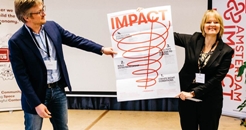 How to build an impact city: nurture neighbourhoods
How to build an impact city: nurture neighbourhoods
From an article by Pioneers Post
Small impact ventures can make a big difference in their local communities. But sometimes, they need a helping hand with funding and expertise. That’s where city government initiative Amsterdam Impact is stepping in, as part of its multi-year plan to help make impact entrepreneurship the default way of doing business.
Amsterdam is a modern-day melting pot, home to people of 180 nationalities. This incredible diversity brings challenges, such as how to support newcomers with a migrant background in Amsterdam Zuidoost (southeast) district, where they make up 83% of the population of the Bijlmer Centrum neighbourhood, for instance.
Some districts face other challenges: in Amsterdam Zuid (south), where many older people live, it’s important to ensure that they feel connected to their neighbours and live independently at home for as long as possible.
Impact entrepreneurs can often solve these challenges in their community, thus contributing to healthier, more sustainable and more inclusive neighbourhoods. “Small impact enterprises are a crucial part of a community’s fabric,” says Ellen Oetelmans, programme manager at Amsterdam Impact. “Their societal impact is really tangible and direct. They are so well-connected to the neighbourhood and have a clear picture of what residents need and how their businesses can contribute to that. And they broaden a community’s horizon and inspire locals to become more actively involved in their communities.”
But small impact enterprises frequently need funding and expertise to make a real difference. That’s where competitions and business development initiatives, co-created by Amsterdam Impact, come in. For example, Amsterdam Impact’s 2018 contest, ‘Localise the SDGs’, that aimed to support entrepreneurs implementing one or more of the Sustainable Development Goals in Amsterdam. The contest matched organisations grappling with social impact-related challenges with innovative entrepreneurs. Once a match was made, the entrepreneurs received a grant of €30,000 and six months of expert mentoring to help them implement their solution.
One match was Fawaka Entrepreneurship School’s project, Tha Block Bizkids. This project contributed to SDG 10 (reduced inequality) and SDG 12 (responsible consumption and production) by teaching sustainable entrepreneurship to children, aiming to reach 300 nine to 12-year-olds in Amsterdam neighbourhoods affected by socio-economic deprivation. Fawaka guided them in discussing SDG-related local challenges. Then the children researched issues in their neighbourhoods and came up with social enterprise ideas to tackle them, under the supervision of business professionals. One kid pitched the idea of putting ‘eyes’ on bins, because people are more likely to throw their garbage in the bin if they feel watched. Another, living in a village served by few buses, proposed an app to help people coordinate transport and to get to know each other.
Finally, the children pitched their solutions to an audience of families, school peers, local residents, city officials and experts from other organisations involved in the programme.
In 2021, Amsterdam Impact worked with the municipality’s seven districts to launch Boost je Buurt (‘Boost your Neighbourhood’), a challenge for impact-driven entrepreneurs who strive to make Amsterdam’s neighbourhoods healthier, more inclusive and more sustainable.
Twenty-eight entrepreneurs – four in each of the city’s seven districts – were selected to join an entrepreneurship development programme led by Impact Hub Amsterdam, to help them set up or accelerate their neighbourhood-focused impact enterprises. To hone their offerings, Boost je Buurt participants received one-on-one business coaching, took part in workshops introducing methods like asset-based community development, and joined networking events and meetings with financial and legal experts.
“What is great is that the participants have formed networks in their respective neighbourhoods and started cooperating with fellow entrepreneurs,”
Amsterdam Impact also played an active role in connecting entrepreneurs to contacts both in and outside the city administration. For instance, van Wees introduced Vini Mini, which develops nutritional products for a child’s first three years, to the local chapter of the public health service.
Once they completed the programme, the 28 participants campaigned for the votes of fellow Amsterdammers. Over 4,000 Amsterdam residents voted, which shows Boost je Buurt had a broader impact than just a prize competition. It’s also about raising awareness.
The votes were tallied, and at the programme’s final event in June 2021, public prizes of €2,500, €5,000 and €7,500 were awarded to the top three participants. A second set of prizes, with the same prize money, was awarded by a professional jury.
The jury awarded first prize to Bijlmer Bookstore, which sells books written by people of colour; second prize to Women Skate the World; and third to SPIN AI, which employs people with autism for data annotation services in the field of artificial intelligence.
“To people who want to start an impact company, we would say: do it! By just starting with something as small as creating an Instagram account, you have that impulse to keep going,” say Nathifa and Zuwena Elshot, co-founders of Bijlmer Bookstore.
The two sisters were the big winners as they also took home the €7,500 public prize. Second place went to Schrijver in je Buurt, which helps writers connect digitally with local people and organisations. And De Buurtkringloop, a neighbourhood meeting place and second-hand shop, won third prize.
“Everyone has made valuable connections – with other entrepreneurs, people in their neighbourhoods or civil servants,” says Amsterdam Impact’s Ellen Oetelmans. “As the municipality, we will continue to support local impact entrepreneurs. We are already working on the 2022 edition of Boost je Buurt.”
Read the full article here.
Note the focus on neighbourhoods rather than boroughs or city-wide initiatives. Each neighbourhood has different characteristics and needs. Note also the relatively low cost power of challenge and competition. Is this something you can initiate in your town or city and have a multiplying impact effect?
Retweet about this article:
From an article by Pioneers Post, 14/12/2021